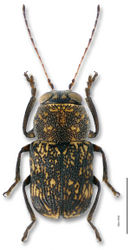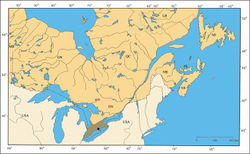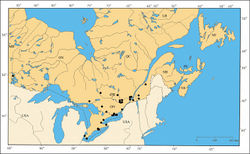Pachybrachis spumarius
| Notice: | This page is derived from the original publication listed below, whose author(s) should always be credited. Further contributors may edit and improve the content of this page and, consequently, need to be credited as well (see page history). Any assessment of factual correctness requires a careful review of the original article as well as of subsequent contributions.
If you are uncertain whether your planned contribution is correct or not, we suggest that you use the associated discussion page instead of editing the page directly. This page should be cited as follows (rationale):
Citation formats to copy and paste
BibTeX: @article{Barney2013ZooKeys332, RIS/ Endnote: TY - JOUR Wikipedia/ Citizendium: <ref name="Barney2013ZooKeys332">{{Citation See also the citation download page at the journal. |
Ordo: Coleoptera
Familia: Chrysomelidae
Genus: Pachybrachis
Name
Pachybrachis spumarius Suffrian, 1852 – Wikispecies link – Pensoft Profile
- Pachybrachys spumarius Suffrian, 1852: 179.
- Pachybrachis roboris Fall, 1915: 420.
Recognition
Elytra and pronotum with small yellow spots and diffuse rufous mottled marks; prothoracic puncturation dense, extending to side margins (Habitus 14); ocular lines absent; aedeagus tubular with terminal nodule (Figure 10b) or nipple-shaped apex when seen from above (Figure 10c); male size small: length 1.91 ± 0.13 mm, width 1.06 ± 0.05 mm.
Distribution
Eastern species distributed from southern Saskatchewan to Texas to Atlantic Coast (Riley et al. 2003[1]), and present in southern Ontario and Québec in eastern Canada. The Ottawa Valley and the south of eastern Townships, in Québec, are probably the northernmost distribution limit of Pachybrachis spumarius (Map 14).
Material examined
ONTARIO: Carleton Co., Britannia, 28.VI.1931, L. J. Milne [1♂ 1♀, UNHC]; same data, except 19.VII.1949, R. de Ruette [1♀, CNC]; Britannia Heights, 16.VII.1958, S. D. Hicks [1♂, CNC]; Constance Bay, 10.VII.1941, W. J. Brown [1♀, CNC]; Carp, 5.VII.1932, W. J. Brown [1♂, CNC]; Essex Co., Ojibway, 24.VI.1945 [1♀, CNC]; Pelee Island, 3.VII.1931, W. J. Brown [1♂ 1♀, CNC]; Roseland, 26.VI.1944, S. D. Hicks [1♀, CNC]; Hasting Co., 2.IX.1934, J. F. Brimley [1♂ 1♀, CNC]; same data, except 25.VII.1954 [1♂, CNC]; Leeds Co., Lindsay Island, Saint Lawrence Island National Park, 15.VII.1976, ex. Betula papyrifera, W. Reid [2♂, CNC]; Mermaid Island, Saint Lawrence Island National Park, 23.VII.1976, W. Reid [1♀, CNC]; Lennox & Addington Co., 16.VII.1939, J. F. Brimley [1♀, CNC]; same data, except 6.IX.1948 [1♀, CNC]; same data, except 10.VII.1949 [3♀, CNC]; Lincoln Co., DeCew Falls, 27.VII.1940, S. D. Hicks [1♀, CNC]; Norfolk Co., Turkey Point Provincial Park, 24.VII.1984, sweeping in mixed forest, L. LeSage [3♂, CNC]; Walsingham, 11.VII.1956, W. J. Brown [6♂ 7♀, CNC]; Walsingham Forest Station, 25.VII.1984, ex. Rhus typhina, L. LeSage [45♂ 47♀, CNC]; Northumberland Co., 2.IX.1950, J.F. Brimley [1♀, CNC]; Prince Edward Co., 10.VII.1935, J. F. Brimley [3♂ 3♀, CNC]; same data, except 21–25.VII.1937 [5♂ 9♀, CNC]; same data, except 3.VII.1938 [1♀, CNC]; same data, except 13.VII.1941 [1♂, CNC]; same data, except 16.VII.1947 [6♂ 2♀, CNC]; same data, except 5–19.VII.1950 [3♂ 3♀, CNC]; same data, except 5.VII.1953 [1♀, CNC]; same data, except 7.VII.1954 [1♂ 1♀, CNC]; Clearwater Bay, 30.VII.1996, sweeping miscellaneous vegetation, B. F & J. L. Carr [2♀, CNC]; Toronto Co., Toronto, 15.VIII.1908, R. J. Crew [1♀, ROM]; Kelly Lake, 26.VII.1933, L. J. Milne [1♂, UNHC]; Victoria Co., Coboconk, 2.VIII.1948, J. F. B. [2♂ 1♀, CNC]; Unknown Co., East Ontario [1♂ 1♀, CNC].
QUÉBEC: Bagot Co., Saint-Pie, 1.VII.1985, ex. Acer rubrum L., Larochelle & Larivière [1♂, CNC]; Châteauguay Co., Ormstown, 12.VII.1977, sweeping sumac, E. J. Kiteley [3♂ 2♀, CNC]; Deux-Montagnes Co., La Trappe, 19–22.VII.1945, J. Ouellet [1♂ 1♀, CEUM]; same data, except 7.VII.1946, [1♀, CEUM]; same data, except 13–15.VII.1949 [2♂ 4♀, CEUM]; same data, except 8–23.VII.1950, ex. Virginia sumac [27♂ 35♀, CEUM]; same data, except 1–8.VIII.1950, ex. Virginia sumac [9♂ 5♀, CEUM]; same data, except 27.VII.1951 [6♂ 7♀, CEUM]; Gatineau Co., Mont-King, Parc de la Gatineau, 19.VII.1981, P. Bélanger [1♂ 2♀, LFC]; Kazabazua, 3.IX.1967, H. J. Teskey [1♀, CNC]; Missisquoi Co., Phillipsburg, 15–19.VII.1969, J. L. Laliberté [1♂ 1♀, IDM]; same data, except 29.VII.1972 [3♂ 4♀, IDM]; same data, except 22.VI.1975 [2♂, IDM]; Pontiac Co., Luskville, 30.VII.1985, ex. Quercus alba L., Larochelle & Larivière [1♀, CNC]; Témiscamingue Co., Laniel, 14.VIII.1932, W.J. Brown [1♀, CNC]; Vaudreuil Co., Hudson Heights, 24–30.VII.1956, Lindberg [1♂ 1♀, CNC]; Rigaud, 26.VII.1902, F. Knab [1♂ 1♀, USNM]; same data, except 25.VII.1939, A. Robert [1♂, CEUM]; same data, except 15.VIII.1972, on sumac, E. J. Kiteley [3♂, CNC]; same data, except 13.VII.1973, sweeping sumac [1♂ 3♀, CNC]; same data, except 22.VII.1974, on sumac [3♂ 2♀, CNC]; same data, except 27.VIII.1977, on sumac [1♂ 1♀, CNC]; same data, except 16.VIII.1984, ex. Rhus typhina L., Larochelle & Larivière [1♀, CNC]; Saint-Lazare, 9.VIII.1982, UV light in a pine plantation, A. Larochelle [1♀, CNC].
Host plants
Several specimens were recorded as being collected from Rhus typhina L., Virginia sumac, or just sumac (Anachardiaceae), which are various names for the same plant. Barney and Hall (2011)[2] reported collecting specimens in abundance on Rhus copallina L. and Rhus glabra L., and observed feeding, mating and oviposition on these species in the laboratory. Larochelle cited Acer rubrum L. (Aceraceae) and Quercus alba L. (Salicaceae) as potential hosts on his labels. Betula papyrifera Marsh. (Betulaceae) was also reported here but cannot be confirmed as a plant association.
Comments
Pachybrachis spumarius is the second most commonly collected species in eastern Canada and can often be found in large series on Rhus spp. (Table 1).
Taxon Treatment
- Barney, R; LeSage, L; Savard, K; 2013: Pachybrachis (Coleoptera, Chrysomelidae, Cryptocephalinae) of Eastern Canada ZooKeys, 332: 95-175. doi
Other References
- ↑ Riley E, Clark S, Seeno T (2003) Catalog of the leaf beetles of America north of Mexico (Coleoptera: Megalopodidae, Orsodacnidae and Chrysomelidae, excluding Bruchinae). Coleopterists Society, Special Publication no. 1, 290 pp.
- ↑ Barney R, Hall S (2011) New host plant records for selected Cryptocephaline leaf beetles (Coleoptera: Chrysomelidae) in Kentucky. The Coleopterists Bulletin 65(1): 15-19. doi: 10.1649/0010-065X-65.1.15
Images
|





